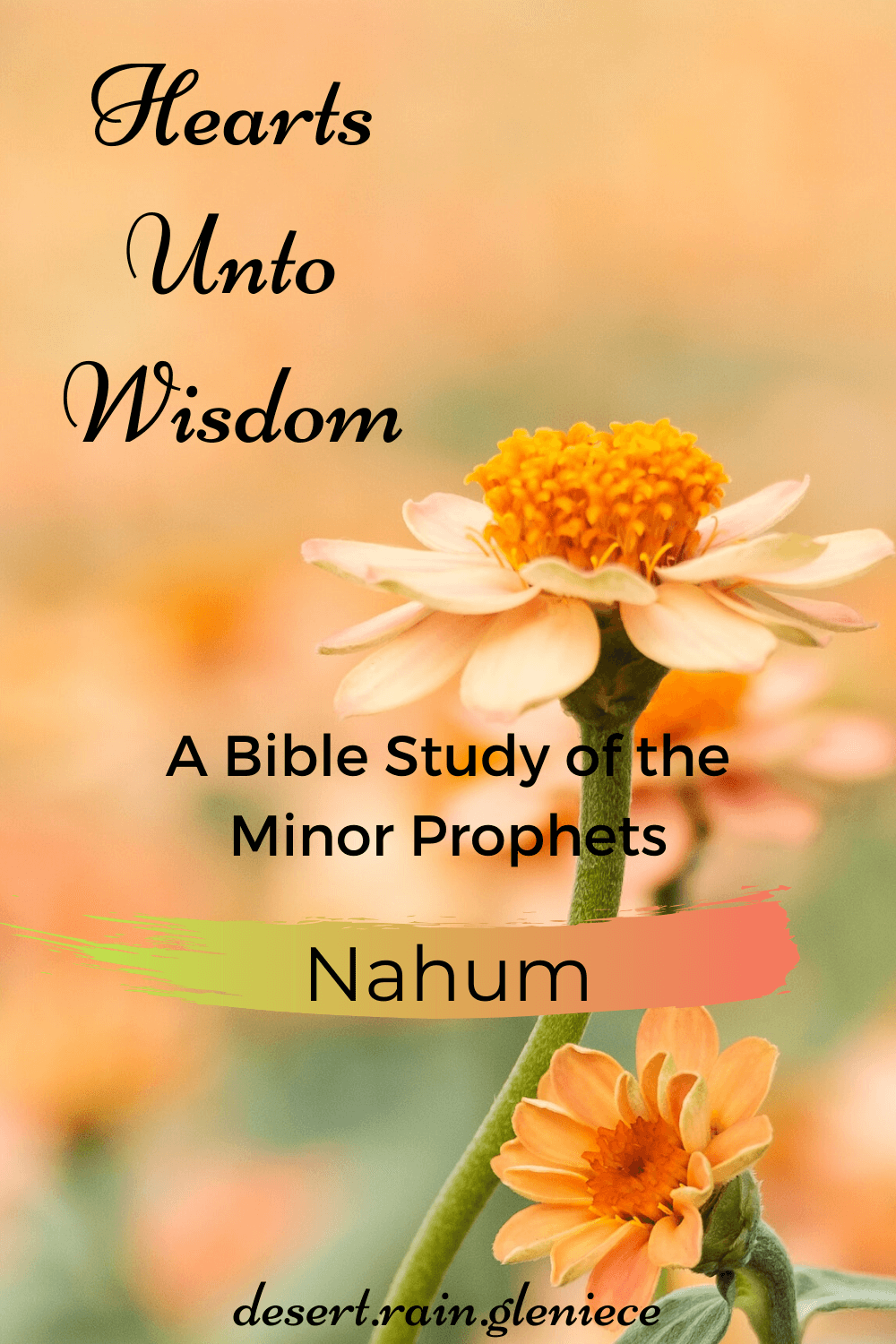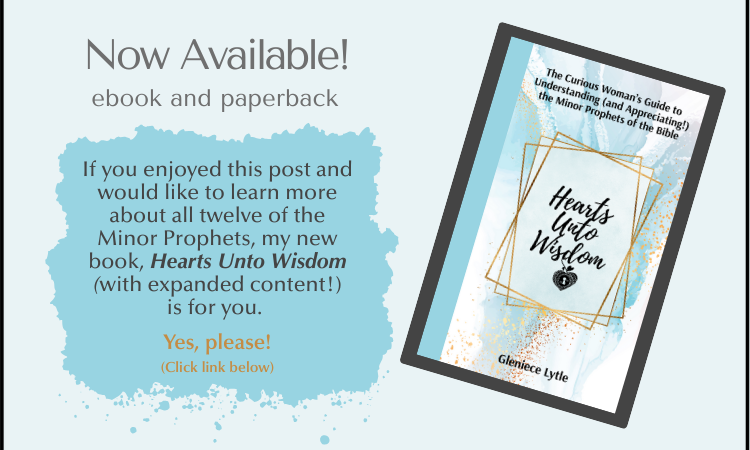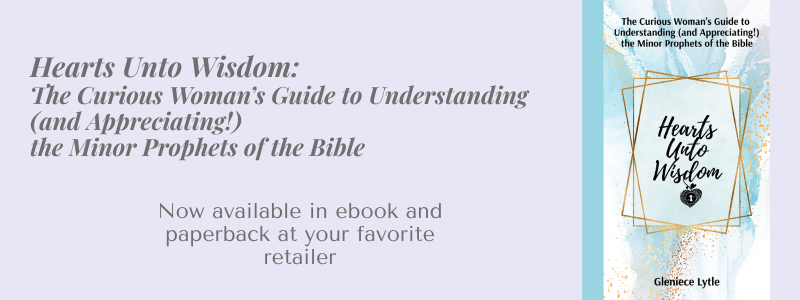God chose Nahum to proclaim the destruction of Nineveh. Yes, the same Nineveh God spared a hundred years before when He sent Jonah to warn them their time was short and they had better repent.
Nineveh, the capital of the Assyrian empire, turned back to rebellion, violence, and witchcraft, and God had had enough.
They brutally devoured the cities round about them like voracious cankerworms (Nahum 3:15). But Nahum declared that as “the cankerworm spoileth and flieth away,” so will Nineveh’s strength, people, and grandeur.
God is exceedingly patient but there is a time when He says “enough” (Revelation 22:11).
And Nahum’s job was to shout enough! to wicked, ruthless Nineveh.
Welcome to Hearts Unto Wisdom
A Bible Study of the Minor Prophets
I thank you for joining me as I share biblical insight into the twelve books commonly referred to as the “Minor Prophets.” These Old Testament books, starting with Hosea and ending with Malachi, are minor only in regard to their length, and not because they lack significance.
So teach us to number our days, that we may apply our hearts unto wisdom. (Psalm 90:12)
[Words in bold or italics added for emphasis to Bible verses throughout this study.]
Nahum
The prophet Nahum, whose name means consolation, consoles us with a sampling of the multitude of God’s virtues in the first chapter of this three-chapter book.
- God is jealous for you (1:2)
- God is slow to anger (1:3)
- God is all-powerful (1:4)
- God is good (1:7)
- God will avenge us our enemies (1:13)
- God knows who are His (1:7)
God is a jealous God
We often think of jealousy as a sinful emotional reaction, yet one of God’s many wondrous names is Jealous.
God is jealous, and the Lord revengeth; the Lord revengeth, and is furious; the Lord will take vengeance on his adversaries, and he reserveth wrath for his enemies. (Nahum 1:2)
For thou shalt worship no other god: for the Lord, whose name is Jealous, is a jealous God. (Exodus 34:14)
I am the Lord: that is my name: and my glory will I not give to another, neither my praise to graven images. (Isaiah 42:8)
Did you know God is jealous for you? Yes, you. You are His treasure and called by His holy name and He will fight off legions of evil for your sake. When you suffer injustice, He will not forget. Those who dare cause you wrongful pain will be held accountable.
Jealousy is multifaceted.
When someone receives the very thing we’ve longed for, prayed for, and cried over—oh, why couldn’t it have been given to me?—jealousy creeps up brazen and defiles us with self-pity, if we’re not careful.
King Saul was awash in jealousy and self-pity when young David garnered more acclaim from battle than he had. “They have ascribed unto David ten thousands, and to me they have ascribed but thousands: and what can he have more but the kingdom?” (1 Samuel 18:8). You can almost hear the whine in his voice, can’t you?
(Don’t confuse jealousy with envy. When you feel envy, you resent and harbor ill will toward the person who has the advantages and possessions you want but don’t have—like Saul eventually felt toward David. There is no such thing as godly envy, but there is godly jealousy.)
For I am jealous over you with godly jealousy: for I have espoused you to one husband, that I may present you as a chaste virgin to Christ. (2 Corinthians 11:2)
We feel jealous if our friend pays more attention to another friend than she does to us. If our husband behaves extra friendly to another woman—watch out—even if it’s merely a perceived slight. Jealousy makes us feel fiercely protective of our loved one’s heart and their affections toward us. But our jealous feelings are not always righteous.
Only God’s jealousy is pure.
God’s name is holy and with godly jealousy He guards His name’s sake. He doesn’t want us polluting His name by claiming we are His but living like harlots instead (1 Corinthians 6:15).
Husbands (and wives) become jealous in infidelity and are resentfully suspicious of a rival. When a husband finds his wife unfaithful to him, it crushes him and drives him to fury. Against the woman who hurt him and against the one she chose to love more than him.
This is how ancient Israel treated her Husband. Other nations and their gods were more important to her. But marriage calls for exclusive loyalty to our spouse and to God.
God was jealous for them and He is jealous for us and will not allow anyone or anything to intrude upon our union with Him.
The Israelites provoked God to jealousy often and sadly, many of us do the same when we allow the furrows we plow in this world to bury our first love (Revelation 2:4).
Ye cannot drink the cup of the Lord, and the cup of devils: ye cannot be partakers of the Lord’s table, and of the table of devils. Do we provoke the Lord to jealousy? are we stronger than he? (1 Corinthians 10:21–22)
God knows our best place is by His side. He knows our most content lives are lived within His generous and loving boundaries. He gives us free will to accept or deny our calling. But if we deny God’s goodness, if we refuse His will, what do we have to look forward to but a life of doubts and sorrows, scrabbling and clamor, and eventually, the finality of His coming wrath (Hebrews 3:12)?
God is always good, but as we do the hard work of trusting Him, His goodness flows freely into our lives and our natural fear of losing our hopes, our dreams, our very selves, recedes.
What comfort Nahum speaks here:
The Lord is good, a stronghold in the day of trouble; and he knoweth them that trust in him. (Nahum 1:7)
Oh how great is thy goodness, which thou hast laid up for them that fear thee; which thou hast wrought for them that trust in thee before the sons of men! (Psalm 31:19)
No place for repentance
The inhabitance of Nineveh came to a point of no return. They provoked God by refusing the mercy and goodness He lovingly gave them a century before. They preferred living by wicked pursuits and prevailed in them with an air of superiority. Like young lions, Nineveh didn’t fear anyone (Nahum 2:11–12). But “who can stand before [God’s] indignation? and who can abide in the fierceness of his anger?” (Nahum 1:6).
Every day it seems like the wicked, godless haters of this world are prevailing and getting away with horrendous crimes, but God has not forgotten “and will not at all acquit the wicked” (Nahum 1:3).
And the Lord hath given a commandment concerning thee, that no more of thy name be sown. (Nahum 1:14)
Behold, I am against thee, saith the Lord of hosts, and I will burn her chariots in the smoke, and the sword shall devour thy young lions: and I will cut off thy prey from the earth, and the voice of thy messengers shall no more be heard. (Nahum 2:13)
God promised to make a final end of Nineveh and in the year 612 B.C., the last year of Nahum’s prophecy, Nineveh was indeed destroyed. Its ruins were so deeply buried they were not identified until 1845.
God promises at His glorious return to make an utter end to any who revel in evil as Nineveh did. There will be no second chance for it to spring back up and infect us (Nahum 1:9).
God’s Word never fails
The prophecies spoken by Nahum overlapped the prophecies spoken by Jeremiah. By the time Jeremiah prophesied, the destruction of Assyria, with Nineveh its capital, had already happened.
God punished Assyria as He later would Babylon.
Therefore thus saith the Lord of hosts, the God of Israel; Behold, I will punish the king of Babylon and his land, as I have punished the king of Assyria. (Jeremiah 50:18)
Assyria was a savage kingdom filled with atrocities and cruelty, but its final end was secured by the might of God’s righteous judgment.
[A]ll that hear the bruit of thee shall clap their hands over thee: for upon whom hath not thy wickedness passed continually? (Nahum 3:19)
The word bruit in the King James Version means “announcement, something heard, news, or report.” When the outlying cities were to hear of Nineveh’s demise, they would be thoroughly glad (clapping their hands) for all the terror and destruction inflicted on them.
Not only was Nineveh cruel, but sure of its power and filled with pride and arrogance.
Art thou better than populous No, that was situate among the rivers, that had the waters round about it, whose rampart was the sea, and her wall was from the sea? . . . Yet was she carried away . . . (Nahum 3:8, 10)
Populous No, also known as Thebes, was sacked by Assyria in 663 (the beginning of Nahum’s prophecy). Fifty years later, Assyria, along with Nineveh, its capital, was sacked by Babylon.
God used Assyria to take down the city of No and used Babylon to take down Assyria.
Niniveh could not save herself. No one who fights against God can. Nineveh‘s strength was likened to overripe figs dropped into the waiting mouth of the eater God brought to destroy her (Nahum 3:12).
Behold, I am against thee, saith the Lord of hosts; and I will discover thy skirts upon thy face, and I will shew the nations thy nakedness, and the kingdoms thy shame. And I will cast abominable filth upon thee, and make thee vile, and will set thee as a gazingstock. (Nahum 3:5–6)
Nineveh thought she was lovely; God thought she was vile (Nahum 1:14). She could not justify her strength, her wealth, or her importance in the world to Him. Neither can we. We cannot stand before God and prove anything except how vile we are apart from Him.
When the Bible speaks of abominable filth, no matter who we are or where we come from, we can all agree on the definition. It’s something none of us wants to be covered in! Yet, this is what God says will happen to those who live by pride and evil (Nahum 3:6).

There are several parallels of unfavorable descriptions between Nineveh and ancient Israel.
- Nahum cried against Nineveh, “Woe to the bloody city! it is all full of lies and robbery; the prey departeth not” (Nahum 3:1). Jerusalem was also a bloody city that stored up robbery and violence in her palaces (Amos 3:10; Ezekiel 24:9).
- Nineveh behaved as a well-favored harlot (Nahum 3:4), but according to God, Israel and Judah did shamefully worse (Jeremiah 3:6–11, 20; Ezekiel 16:15)).
- Nahum cried against Nineveh, “There is no healing of thy bruise; thy wound is grievous” (Nahum 3:19). Jerusalem’s wound was incurable, too, (Micah 1:9) because they refused to believe they needed healing.
- Nineveh was a mistress of witchcraft who sold nations through her whoredoms and families through her witchcraft (Nahum 3:4). Many wicked kings of Israel and Judah did likewise (2 Chronicles 33:6). And the priests of Israel sold whole families into error by ignoring God’s commands and making excuses for disobedience.
The same satanic spirit that infected Nineveh and Babylon, and all the nations of the world since, is the same spirit that will fight against God’s chosen people (us) in the tribulation/end times (Revelation 17:5–6).
What can we learn from the book of Nahum and the downfall of Nineveh?
- Never trust in money, status, or strength to get us through this life
- We are not exempt from correction
- Never take God’s gift of mercy for granted
- After we repent, never, never go back to the filth of the world in which we have escaped (2 Peter 2:20–22)
God turned away the excellency—or pride as the word here means—of the children of Israel (Jacob, Nahum 2:2) by means of captivity and famine and hardships to draw them closer to Him. Some humbled themselves and turned back to God. Some didn’t.
God turns away our excellency, too, our reliance on ourselves and anything and everything we hold up higher than Him for our own good.
Your beautiful feet
How beautiful upon the mountains are the feet of him that bringeth good tidings, that publisheth peace; that bringeth good tidings of good, that publisheth salvation; that saith unto Zion, Thy God reigneth! (Isaiah 52:7)
Nahum repeats what the prophet Isaiah spoke of the beauty of those who bravely declare the good news that peace comes only through our Savior.
Behold upon the mountains the feet of him that bringeth good tidings, that publisheth peace! O Judah, keep thy solemn feasts, perform thy vows: for the wicked shall no more pass through thee; he is utterly cut off. (Nahum 1:15)
And Paul reminds us of the same truth in Romans:
And how shall they preach, except they be sent? as it is written, How beautiful are the feet of them that preach the gospel of peace, and bring glad tidings of good things! (Romans 10:15)
But how do you publish peace, my friends?
You publish peace by speaking the truth of the Bible—the joys and the warnings. Because there is no peace without repentance. It does not exist.
The false prophets of old were guilty of proclaiming what God had not said for gain and selfish comfort.
Thus saith the Lord; Woe to the foolish prophets, that follow their own spirit, and have seen nothing! . . They have seen vanity and lying divinations, saying, The Lord saith: and the Lord hath not sent them: and they have made others to hope that they would confirm the word . . . they have seduced my people, saying, Peace, when there was no peace . . . (Ezekiel 13:3–10)
Christ calls us to deny ourselves, take up our cross, and follow Him (Mark 8:34). But many of us refuse to budge, let go of our “rights,” or venture beyond our comfort zones within our Christian lives.
We live in fear and conflict with a smile on our face and a Bible in our hands. We harbor resentment, live without thanks, and stubbornly refuse to forgive.
But there is no peace without repentance. It does not exist.
Peace is living in the love of God. It is the permanence of the righteousness of Jesus Christ abiding in us. It is the fruit of all the struggle and patience and hardships and burdens and tribulations we are facing right now.
Thou wilt keep him in perfect peace whose mind is stayed on thee: because he trusteth in thee. (Isaiah 26:3)
So carry on, dear Christian. Do not be afraid. Keep doing what must be done.
Announce the Good News by your daily example of cross-bearing. Speak not what feels right nor follow your own spirit as the false prophets did, doling out false hope to a willing crowd. But speak the truth that comes from the Word.
For it is Christ who is the culmination of all our hopes. He is our peace. And we publish peace by gladly declaring what Christ has done for us.
Abiding in the Vine,
~ Gleniece

Hearts Unto Wisdom
If you like this content and would like to stay up to date, please sign up below for my monthly newsletter, Abide & Blossom. I look forward to seeing you on my list. Thank you!
Would you like to share this post?



